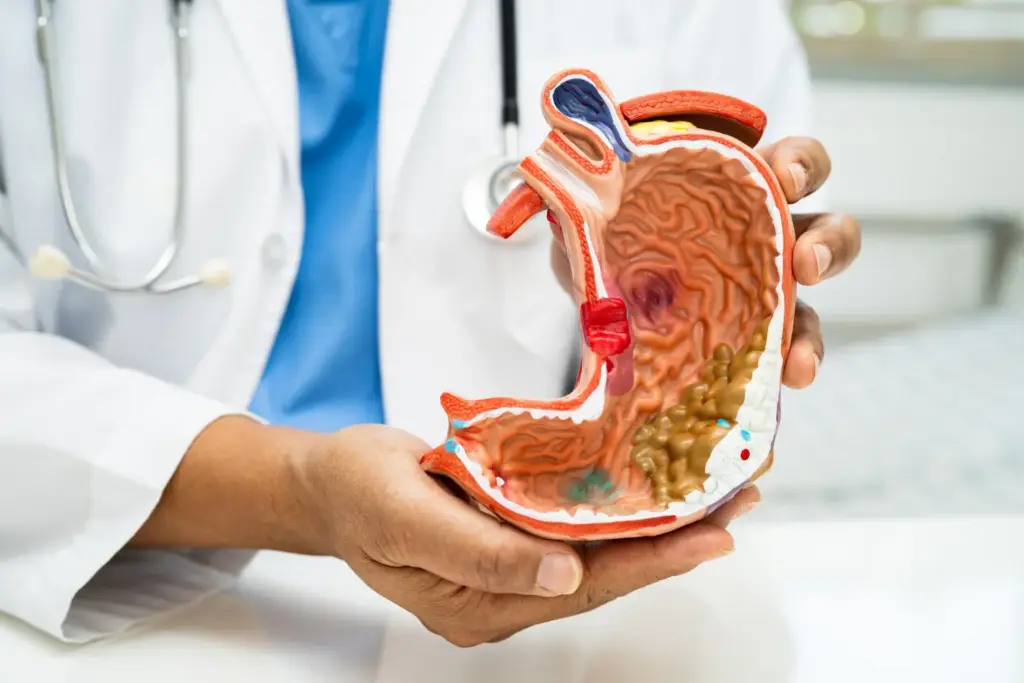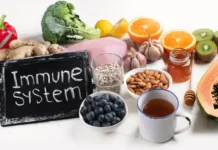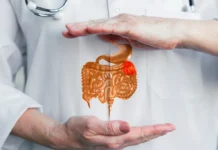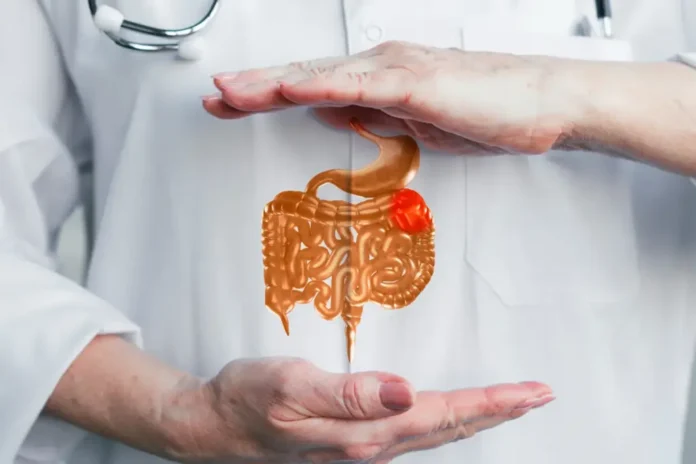Peptic ulcers, inflammatory sores affecting the inner tissue lining of digestive organs, manifest in various forms, such as stomach ulcers, duodenal ulcers, and esophageal ulcers. While not uncommon, affecting approximately 10% of adults worldwide, peptic ulcer disease demands attention due to its potential complications.
Symptoms of Peptic Ulcers:
Common symptoms include nausea, abdominal pain, bloating, heartburn, bloody stool, chest pain, vomiting (sometimes with blood), sudden weight loss, appetite changes, difficulty breathing, and a feeling of faintness. Seeking medical attention is crucial when symptoms persist or worsen despite over-the-counter medications.
Causes of Peptic Ulcers:
These ulcers result from acid erosion on the inner tissue lining of the stomach, oesophagus, or duodenum. The breakdown of the protective mucus layer, responsible for shielding against digestive acids, occurs due to increased acid concentration or a compromised mucus lining.
Two main factors leading to mucus lining breakdown are:
- Helicobacter pylori (H. pylori) bacteria: Half of the global population harbours these bacteria, which, in some cases, may cause infections leading to peptic ulcers. Transmission methods include close physical contact and possibly contaminated water or food.
- Pain Medications: Frequent use of non-steroidal anti-inflammatory drugs (NSAIDs), such as ibuprofen and aspirin, hampers mucus layer replenishment, increases stomach acid production, and reduces blood flow, heightening the risk of peptic ulcers.
Risk Factors for Peptic Ulcer Disease:
Factors increasing susceptibility include heavy smoking, excessive alcohol consumption, chronic stress, prolonged use of corticosteroids, and regular consumption of spicy foods.
Complications Arising from Peptic Ulcers:
Untreated peptic ulcers can lead to internal bleeding, stomach perforation, blockage in the digestive tract, and an elevated risk of gastric cancer. Timely treatment is crucial to preventing these complications.
Treatment of Peptic Ulcers:
Treatment varies based on the underlying cause. H. pylori-induced ulcers are treated with proton pump inhibitors and antibiotics, while NSAID-caused ulcers involve discontinuing the medications and considering alternatives. Antacids may be prescribed for milder cases, and surgery is an option for severe complications.
Prevention of Peptic Ulcers:
Preventive measures involve reducing alcohol and NSAID consumption, quitting smoking, managing stress, and incorporating a balanced diet with less spicy food and more fruits and vegetables. Maintaining cleanliness in water and food, as well as proper cooking, helps prevent H. pylori infections.
Conclusion:
Understanding the symptoms, causes, treatment, and preventive measures for peptic ulcers is crucial for maintaining digestive health. If symptoms persist, immediate medical attention is recommended. For more information, consult with Medical Seek.
Peptic Ulcers: Facts and FAQs

Ulcers are sores that develop in the lining of the digestive tract, particularly the stomach and duodenum (the first part of the small intestine). Understanding the common facts and frequently asked questions about peptic ulcers can help you recognize potential symptoms and manage your health effectively.
Key facts about peptic ulcers:
What are the most common causes of peptic ulcers?
- Helicobacter pylori (H. pylori) infection: This bacterium disrupts the protective mucus lining of the stomach, making it vulnerable to acid damage.
- Nonsteroidal anti-inflammatory drugs (NSAIDs): Overuse of medications like aspirin, ibuprofen, and naproxen can irritate the stomach lining.
- Smoking: Smoking weakens the stomach’s defences against acid and increases the risk of ulcers.
- Other factors, such as stress, alcohol consumption, and certain medical conditions, can also contribute to ulcer formation.
What are the common symptoms of peptic ulcers?
- Burning pain in the upper abdomen, often between meals or at night
- Loss of appetite or nausea
- Bloating or indigestion
- Vomiting, sometimes with blood
- Dark, tarry stools or black vomit (signs of bleeding)
What complications are normally associated with peptic ulcers?
- Bleeding
- Perforation (hole) in the stomach or small intestine
- Obstruction of the stomach outlet
How are peptic ulcers diagnosed?
- Endoscopy: A thin, flexible tube with a camera inserted through the mouth to examine the stomach and duodenum.
- Stool test: Checks for H. pylori infection.
- Barium swallow: X-ray that uses a thick liquid to highlight ulcers.
How are peptic ulcers treated?
- Antibiotics to eradicate H. pylori
- Proton pump inhibitors (PPIs) to reduce stomach acid
- Histamine-2 receptor antagonists (H2RAs) to reduce stomach acid
Lifestyle changes: Quitting smoking, managing stress, and avoiding NSAIDs (unless prescribed by your doctor).
Frequently Asked Questions about Peptic Ulcers:
Do all people with H. pylori have ulcers?
No, only a small percentage of people with H. pylori develop ulcers.
Can ulcers be cured?
Yes, with proper treatment, most ulcers can be cured.
Will I need surgery?
Surgery is rarely needed for ulcers, but it may be necessary for complications like perforation or bleeding.
What can I eat to prevent ulcers?
Focus on a healthy diet with plenty of fruits, vegetables, and whole grains. Limit acidic, spicy, and fatty foods.
Can I drink alcohol if I have ulcers?
Alcohol can irritate the stomach lining and worsen ulcer symptoms, so it’s best to avoid it.














